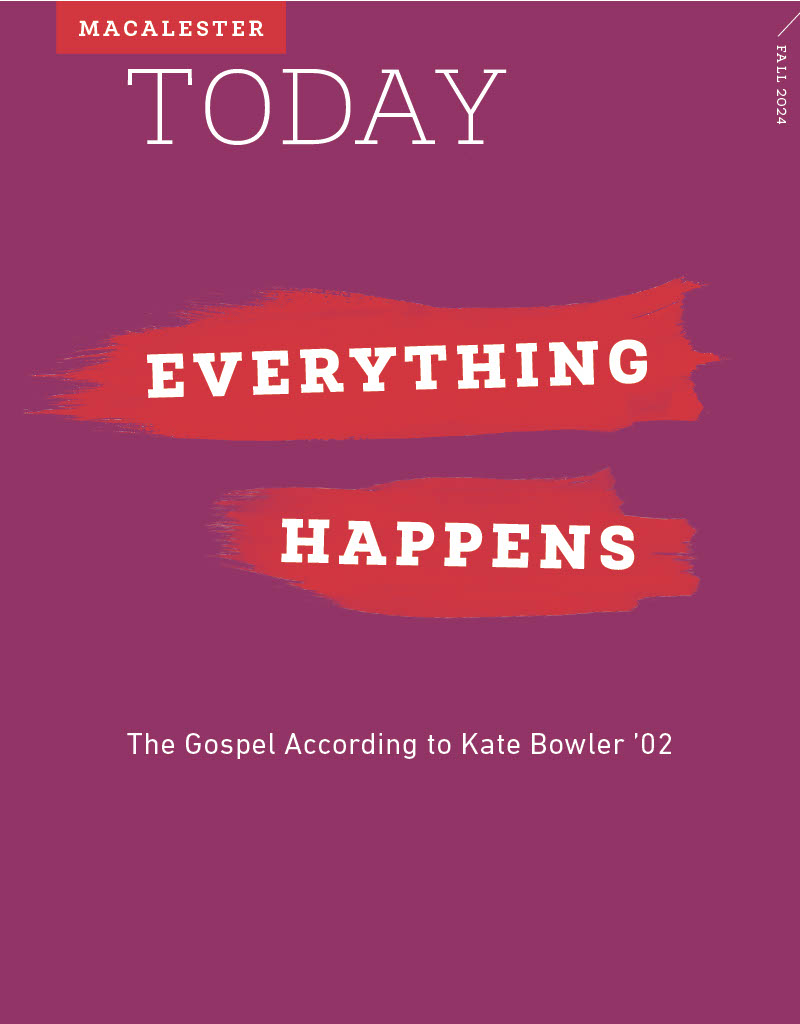
By Erin Peterson / Photos by David J. Turner
Significant experiences outside the classroom, including student leadership opportunities, internships, and study away programs, contribute to a student’s success in college and beyond. While Macalester has supported and encouraged these practices for decades, the Imagine, Macalester strategic planning process identified opportunities to do more. Currently, a working group is creating an inventory of existing experiences and identifying barriers to expanding the number of these opportunities available to students. When the college’s campaign kicks off, alumni and friends will be able to support these experiences for all students. Here, five students explain how high-impact practices have changed their lives.
When Mathilda Barr ’25 arrived at Macalester from Los Angeles as a first-year student in the fall of 2021, she admits she felt a bit adrift. “Covid had placed many Mac experiences on pause, and it was hard to feel a sense of community with my class,” she says.
On a whim, she joined the Macalester College Student Government’s (MCSG) Student Services and Relations Committee as an at-large member. The committee focused on improving equity, inclusion, and the student experience at the college. She knew almost immediately that she’d found a fit. “When I noticed something that frustrated me, I knew I could take initiative to change it—or at least make a difference,” she says. “It gave me a feeling of contributing back to campus. I wasn’t just passing through.”
By her sophomore year, she’d been elected vice president of MCSG. In that role, she worked closely with campus leadership, including Dr. Kathryn Kay Coquemont, vice president for Student Affairs. Barr gathered and responded to student feedback about campus services. And she worked to restructure the roles and responsibilities of student government itself to make it more accessible to students.
Thanks to her efforts, Barr saw an impact not just on campus, but on her own sense of adaptability and competence. “Before student government, I used to think that ideas were only valid when they were fully thought through and all of the details were organized,” she says. “But leadership doesn’t mean that you have to know everything. It means that you have to communicate and delegate things to people during different steps of the process. And that you have to be open to everybody’s ideas.”
Barr’s experience fits into a category of activities known in higher education parlance as “high-impact practices,” says Jen Guyer-Wood, associate vice president of life design and innovation. Such experiences can include leadership roles in on-campus organizations or athletics, summer research, internships, and study away programs.
What connects them? They’re time-intensive projects and activities that happen outside of the classroom. They’re also challenging, they often require students to work closely with faculty and staff, and they demand that students respond to constructive feedback. Research from the Association of American Colleges and Universities has shown that high-impact practices lead to improved critical thinking and writing skills, an increased likelihood of persisting in college until graduation, and greater overall engagement in student life. They also have shown that those who have participated in high-impact experiences as students are more likely to say they are satisfied with their career a decade after graduation than those who did not.
Guyer-Wood says the stories she frequently hears from Macalester alumni mirror these findings. “When I’ve asked alumni about some of the most important things that happened to them outside of the classroom at Macalester, I often hear stories about high-impact practices,” she says.
These national trends and alumni experiences are among the reasons that Macalester continues to encourage and support high-impact experiences for today’s students. So far, it’s working: Guyer-Wood notes that 94 percent of recent Mac graduates engaged in community-based learning, service, or applied research; nearly three in four had an internship or a mentored research experience.
For Coquemont, the positive impact of these experiences goes beyond a student’s future career success and satisfaction: they fuel a healthy and nuanced approach to communication and problem-solving more broadly. “High-impact practices are critical to student success, but we want more for students than just a career,” she says. “We want them to be good people who can stand on their own and be in community with each other—whether those people think like them or not. That’s what high-impact practices can teach.”
These outcomes also are why Macalester has centered this work as part of its strategic plan, and seeks to push its students’ already excellent participation rates in these activities even higher by expanding support and resources through its upcoming campaign.
Barr, for her part, is already seeing the world in more expansive and collaborative ways: she now serves as the media and outreach coordinator for MCSG, and she used the lessons she’s learned and the network she’s built to launch a daylong “public policy hackathon” called MacGPT in the fall of 2023. The event attracted more than fifty students, alumni, and faculty. Her plans for the 2024 event are even more ambitious.
To learn more about how these experiences are supporting student growth, we talked to five current seniors about the activities they’ve chosen, how they’ve made the most of them, and what might come next.
“Leadership roles help me hold myself to a higher standard.”
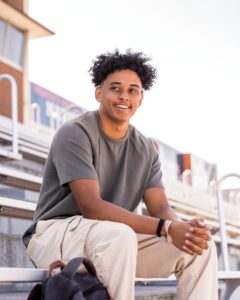 Justin Potts ’25 (Bloomington, Ill.) is a double major in mathematics and physics, with a minor in computer science. He is president of the Student-Athlete Advisory Committee (SAAC) and plays cornerback for the varsity football team.
Justin Potts ’25 (Bloomington, Ill.) is a double major in mathematics and physics, with a minor in computer science. He is president of the Student-Athlete Advisory Committee (SAAC) and plays cornerback for the varsity football team.
When I was looking at colleges in high school, I was interested in going to a place where I could play football and get on the field. When I visited Macalester over the winter, it was negative 17 degrees, but I still liked it.
My first year, then head coach KiJuan Ware picked a few people from each class, including me, for the Student-Athlete Advisory Committee. It’s a committee of varsity athletes who develop programming, including toy drives and cookouts, and support student-athletes by promoting attendance at on-campus competitions and other initiatives.
I went to meetings and I reported back. My sophomore year, I was an atlarge member of the board, where I was put in charge of a competition called Kofi Kup to encourage Mac athletes to support one another at competitions. I was vice president my junior year, and I supervised three other students who did work on social media and database management. I’m president this year, and I’ll be spearheading events including a SAAC career social and the Scot Ball Final Four basketball watch party.
One of the things I like about athletics, and these leadership positions, is that they teach me to be level-headed. I can be a perfectionist when it comes to academics, but with sports, I can understand that I can have a lot of goals, and I might fall short at some of them. But it’s how I react to them, rather than the initial results, that matters.
It’s been really rewarding. It’s not easy to balance school life, social life, athletics, and these other activities. But the leadership roles also help me hold myself to a higher standard. I know that there are more eyes on me. It puts a little fire under me to keep doing better in everything that I can.
“Experiencing something is so different from learning it from a text.”
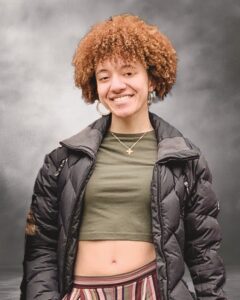 Camille Samuel ’25 (Tampa, Fla.), first row, second from left, is an American studies major. In 2024, she participated in the “Blacks in Paris, Noires á Paris” study away trip over spring break. The trip, part of a semester-long course co-taught by American studies professor Duchess Harris and French professor Juliette Rogers, brought twelve students to the city to examine the relationship Black people, both American and African expatriates, have had to France in the nineteenth and twentieth centuries.
Camille Samuel ’25 (Tampa, Fla.), first row, second from left, is an American studies major. In 2024, she participated in the “Blacks in Paris, Noires á Paris” study away trip over spring break. The trip, part of a semester-long course co-taught by American studies professor Duchess Harris and French professor Juliette Rogers, brought twelve students to the city to examine the relationship Black people, both American and African expatriates, have had to France in the nineteenth and twentieth centuries.
I knew when we went to Paris that we would learn about the relationship that France has to all different kinds of Black people. We’d learn about how Black people brought over jazz, and about how people like dancer Josephine Baker, writer and civil rights activist James Baldwin, and novelist Richard Wright, lived in France.
I didn’t realize how different being there would feel. Living it and experiencing it is so different from learning something from a text, or going on to Google Maps to look at a place. Being there helped personalize it and humanize it for me.
For example, before the trip, we read Rendezvous Eighteenth, a novel written by Black expatriate Jake Lamar. It’s a vibrant portrait of life that follows the story of a Black man in Paris who formerly lived in the US. We had the opportunity to meet him at Café le Saint-Jean, a location where the novel is set. It felt like we were, in a small way, experiencing being in the book.
We also went to Little Africa, a neighborhood in the city where there are many immigrant families and shops. We visited an African restaurant called Mama Kossa.
Yes, we saw the Eiffel Tower and the Louvre, but it was so much more than touristy things. We got to see the life and culture that makes Paris, Paris.
I learned that France approaches the discussion surrounding race differently and, while I cannot wait to return, I also understand the implications that the way identity is perceived is not as colorblind as Parisians believe themselves to be. That’s not to conclude the way the US approaches the conversation is perfect. Finally, I grasped an even greater admiration for the prominent Black figures who made a name for themselves in France. I will always remember and be grateful for this trip. I will be telling this story for years to come.
“I could bring a perspective to a topic in a way that felt valuable.”
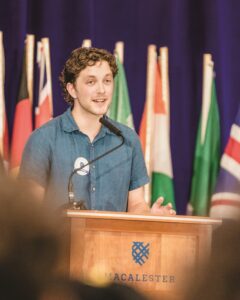 Joel Sadofsky ’25 (Eugene, Ore.) is a geography major and president of Macalester College Student Government.
Joel Sadofsky ’25 (Eugene, Ore.) is a geography major and president of Macalester College Student Government.
When I started at Macalester, I made a point to meet and learn from as many people as I could. That’s one reason I decided to run to become a first-year representative for Macalester College Student Government.
As a representative, one of the things I did was serve as a liaison between the student body and the faculty governing bodies. That meant I went to the monthly faculty meeting, the Educational Policy and Governance Committee meeting, the Academic Affairs subcommittee meeting, and the Board of Trustees meeting. It was like having a fifth class on how higher education governs itself! It was a really cool thing, and also its own world.
Sometimes, I would realize that I was the only person in the room who had the knowledge to contribute to a specific topic.
For example, there was a change to the registration process that influenced how AP and IB credits were recognized. It was minutiae, but I also knew I could advocate for what I thought was right. I could be a bridge between faculty and students, and bring a perspective to a topic in a way that felt valuable.
This work requires a lot of hours. But it also feels important and worthwhile.
“I was out of my comfort zone.”
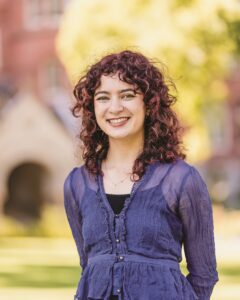 Mathilda Barr ’25 (Los Angeles) is an economics major who is a member of Macalester College Student Government and is a founder of the public policy hackathon MacGPT.
Mathilda Barr ’25 (Los Angeles) is an economics major who is a member of Macalester College Student Government and is a founder of the public policy hackathon MacGPT.
I was one of nine founders of MacGPT, a public policy hackathon. “GPT” stands for Generating Policy of Tomorrow. It’s an all-day event, where teams of up to six people with interdisciplinary majors and interests create a policy solution for an issue that’s presented that morning. This past year, participants developed a water-related policy solution to an existing or future environmental crisis to present to a state, national, or international governing body.
Putting it together was intimidating! I was thinking about funding, logistics, communicating with academic departments and student organizations, and encouraging busy Mac students to commit an entire Saturday to public policy.
The event included faculty mentors and a panel of judges who were knowledgeable in environmental policy. It ended with a networking dinner. We also had a speaker, Catherine Neuschler ’02, the Minnesota Environmental Quality Board executive director.
Nine teams participated, and the winning teams received a cash prize.
It all came together, and it was popular. I was out of my comfort zone, but it also made me feel more competent. After the event was over, I walked around the room and saw all of the brainstorming people had done: PowerPoints, giant Post-it Notes—people were full of ideas, and it was so cool.
I’m already invested in MacGPT for this year: We started planning last spring, and we have sophomores and juniors on our planning team. We want this to be something that will grow and grow. We want this, someday, to be a reason that people want to go to Macalester.
“There are real-world consequences to this work.”
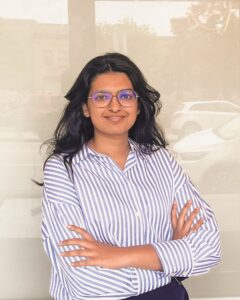 Aahanaa Tibrewal ’25 (Kolkata, India) is a computer science and studio art double major. She has interned at four companies during her time at Macalester, including St. Paul-based Horto-Logic, and DOCSI in northeast Minneapolis.
Aahanaa Tibrewal ’25 (Kolkata, India) is a computer science and studio art double major. She has interned at four companies during her time at Macalester, including St. Paul-based Horto-Logic, and DOCSI in northeast Minneapolis.
In the summer of 2023, I interned with the startup Horto-Logic, which makes a bottlecap that you can attach to a cola bottle, tip it upside down, and use to water your plants for sixty days. I got connected to the company through MacNest, supported by the Entrepreneurship and Innovation Department, where students receive funding for internships with Twin Cities startups. Both the students and the startups have to apply.
I did about one-hundred different things for Horto-Logic that summer! I created a website, packaging, videos, blog posts, and posters. The founder trusted me to do a lot, from selecting color schemes for the website to testing the product itself.
This past summer, I interned with DOCSI, an opportunity I learned about from Connor Valenti ’17, who is DOCSI’s director of engineering. I met him at Macathon, the Entrepreneurship and Innovation Department’s twenty-four-hour idea-building competition, where he was serving as one of the judges.
DOCSI is an eight-person startup in the healthcare industry that optimizes preference cards for surgeons. These are the lists that specify equipment, supplies, instruments, and the room setup required by a surgeon for a specific procedure. There can be a lot of material waste when surgeons request items that they’re unlikely to ever use, so DOCSI provides surgeons with recommendations based on the surgeon’s own historical data and industry data, which can help prevent waste. When the founder and I would go out and talk with someone for a meeting, I could feel the impact of my work.
At DOCSI, I worked on software features to help physicians see more of their data, but I also learned so much about working with coworkers and coordinating across departments. Because this project was in health care, we had high standards—I was held accountable for the things I made, because there are real-world consequences to this work.
Erin Peterson is a Minneapolis-based writer.
November 18 2024
Back to top